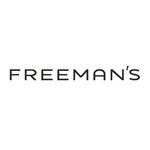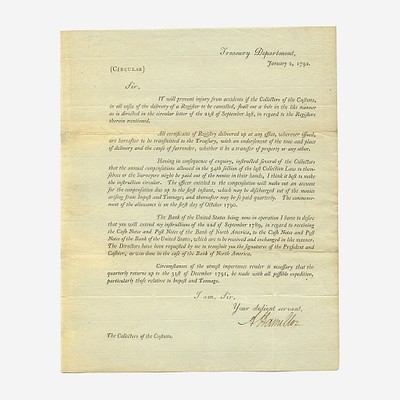[Hamilton, Alexander] [First Bank of the United States] Autograph Letter, signed
About Seller
2400 Market St
Philadelphia, PA 19147
United States
Established in 1805, Freeman’s Auction House holds tradition close, with a progressive mind-set towards marketing and promotion, along with access to a team of top experts in the auction business. And now with offices in New England, the Southeast, and on the West Coast, it has never been easier to ...Read more
Two ways to bid:
- Leave a max absentee bid and the platform will bid on your behalf up to your maximum bid during the live auction.
- Bid live during the auction and your bids will be submitted real-time to the auctioneer.
Bid Increments
| Price | Bid Increment |
|---|---|
| $0 | $25 |
| $500 | $50 |
| $1,000 | $100 |
| $2,000 | $200 |
| $3,000 | $250 |
| $5,000 | $500 |
| $10,000 | $1,000 |
| $20,000 | $2,000 |
| $30,000 | $2,500 |
| $50,000 | $5,000 |
| $100,000 | $10,000 |
About Auction
Oct 25, 2021
Freeman's is honored to present The Alexander Hamilton Collection of John E. Herzog, a single-owner sale of Alexander Hamilton material, on October 25. Curated by Darren Winston, Head of the Books and Manuscripts Department. Freeman's info@freemansauction.com
- Lot Description
[Hamilton, Alexander] [First Bank of the United States] Autograph Letter, signed
Alexander Hamilton writes to the President of the First Bank of the United States concerning the repayment of French debts incurred during the American Revolution
No place, January 12, 1794. One sheet folded to make four pages, 9 7/8 x 8 1/8 in. (251 x 206 mm). Autograph Letter, signed and executed entirely in the hand of Alexander Hamilton as the first United States Secretary of the Treasury, to the first president of the First Bank of the United States, Thomas Willing, regarding the repayment of debts to France incurred during the American Revolution: "I will thank you to inform me how far/it will be convenient for the Bank to go in (word crossed out) discounts/at the usual term to be renewed as heretofore/for Mr. Delaforest (sic) upon the acceptances of the Treasury./The sums are, payable the 3d. of Sep'r�272250/payable the 5 of Nov 181500/453750/Deduct already done�40000/D's 413750/Tis urgent I should know (word crossed out) without delay..." Recipient addressed on verso in Hamilton's hand. Creasing from original folds; remnant of wax seal below signature and on verso; scattered minor soiling and spotting. Lot includes a COA from PSA/DNA.
In order to pay for the Revolution, the United States pursued two routes, printing its own money and securing loans and funds from friendly foreign governments such as France and the Netherlands. With the assistance of Benjamin Franklin, France had secretly been funding the American war effort as early as 1775, and with the treaty of Alliance in 1778, more loans, supplies, and troops, were provided, helping sway the war in the United States' favor. By the end of the war the accumulated debt to France had reached over $3 million, yet with the Articles of Confederation the United States lacked the authority to properly levy taxes to repay those obligations. By 1785 it had stopped paying interest on French loans, and by 1787 it had defaulted on them. This created increasing diplomatic tensions with France, and more broadly, painted a bleak and embarrassing picture to potential international allies. With the passage of the Constitution in 1788, this picture began to change, as the new Federal government was on more firm ground to levy and collect taxes and resume debt payments. Responsibility for this task fell on Secretary Hamilton, who believed it was of prime importance to repay all obligations in a timely manner in order to build international confidence in the new government as well as increase the ability to obtain future loans from the international community. This rare document attests to this undertaking, with Hamilton writing to the first president of the Bank of the United States, Thomas Willing, concerning the amount of French loans to be repaid. Mentioned is Antoine de Laforet, assistant to Jean Antoine Joseph Fauchet, Minister Plenipotentiary to the United States. Hamilton steered the new nation through the financially tumultuous early 1790s and by 1795, with the help of American financier James Swan, who privately assumed all remaining French debts, the United States met its obligations to France.
RR Auction, Boston, August 2015, Lot 182
- Shipping Info
-
No lot may be removed from Freeman’s premises until the buyer has paid in full the purchase price therefor including Buyer’s Premium or has satisfied such terms that Freeman’s, in its sole discretion, shall require. Subject to the foregoing, all Property shall be paid for and removed by the buyer at his/ her expense within ten (10) days of sale and, if not so removed, may be sold by Freeman’s, or sent by Freeman’s to a third-party storage facility, at the sole risk and charge of the buyer(s), and Freeman’s may prohibit the buyer from participating, directly or indirectly, as a bidder or buyer in any future sale or sales. In addition to other remedies available to Freeman’s by law, Freeman’s reserves the right to impose a late charge of 1.5% per month of the total purchase price on any balance remaining ten (10) days after the day of sale. If Property is not removed by the buyer within ten (10) days, a handling charge of 2% of the total purchase price per month from the tenth day after the sale until removal by the buyer shall be payable to Freeman’s by the buyer. Freeman’s will not be responsible for any loss, damage, theft, or otherwise responsible for any goods left in Freeman’s possession after ten (10) days. If the foregoing conditions or any applicable provisions of law are not complied with, in addition to other remedies available to Freeman’s and the Consignor (including without limitation the right to hold the buyer(s) liable for the bid price) Freeman’s, at its option, may either cancel the sale, retaining as liquidated damages all payments made by the buyer(s), or resell the property. In such event, the buyer(s) shall remain liable for any deficiency in the original purchase price and will also be responsible for all costs, including warehousing, the expense of the ultimate sale, and Freeman’s commission at its regular rates together with all related and incidental charges, including legal fees. Payment is a precondition to removal. Payment shall be by cash, certified check or similar bank draft, or any other method approved by Freeman’s. Checks will not be deemed to constitute payment until cleared. Any exceptions must be made upon Freeman’s written approval of credit prior to sale. In addition, a defaulting buyer will be deemed to have granted and assigned to Freeman’s, a continuing security interest of first priority in any property or money of, or owing to such buyer in Freeman’ possession, and Freeman’s may retain and apply such property or money as collateral security for the obligations due to Freeman’s. Freeman’s shall have all of the rights accorded a secured party under the Pennsylvania Uniform Commercial Code.
-
- Buyer's Premium



 EUR
EUR CAD
CAD AUD
AUD GBP
GBP MXN
MXN HKD
HKD CNY
CNY MYR
MYR SEK
SEK SGD
SGD CHF
CHF THB
THB![[Hamilton, Alexander] [First Bank of the United States] Autograph Letter, signed](https://s1.img.bidsquare.com/item/l/9470/9470973.jpeg?t=1MwoET)
![[Hamilton, Alexander] [First Bank of the United States] Autograph Letter, signed](https://s1.img.bidsquare.com/item/s/9470/9470973.jpeg?t=1MwoET)











